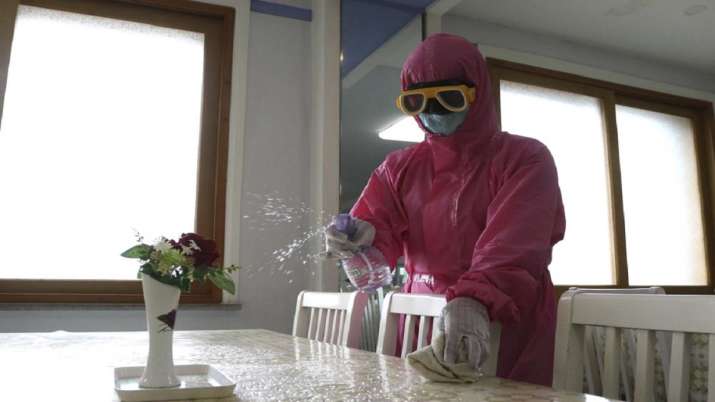
A worker at the Pyongyang Dental Hygiene Products Factory disinfects the floor of a dining room as the state increased measures to contain the spread of the disease, in Pyongyang, North Korea, May 16, 2022. A top World Health Organization official said the coronavirus outbreak in North Korea is “getting better, not better”, despite recent claims from a UN health agency covert country that COVID is slowing there.
Highlight
- WHO said the UN health agency believes the coronavirus outbreak in North Korea is “getting worse”
- WHO’s emergency chief appeals to North Korean officials for more information on COVID cases
- WHO has previously expressed concern about the impact of COVID on the population of North Korea
Coronavirus outbreak in North Korea: A top World Health Organization (WHO) official has said the UN health agency believes the coronavirus outbreak in North Korea is “getting worse, not better”, despite the secret country’s recent claims that COVID-19 is there. is slow.
At a briefing on Wednesday (June 1), WHO’s head of emergencies Dr. Mike Ryan appealed to North Korean officials for more information about the COVID-19 outbreak there, saying, “We have raw materials.” There are real issues in getting access to the data and the actual state. on the ground.”
He said the WHO has not received any privileged information about pandemics – unlike typical outbreaks when countries can share more sensitive data with the organization so that it can assess public health risks to the global community .
“When we don’t have access to the data we need, it’s very difficult to provide a proper analysis to the world,” he said.
The WHO has previously expressed concern about the impact of COVID-19 on the population of North Korea, which is believed to be largely uninfected and whose fragile health systems are fueled by the super-infectious Omicron and its subtypes. May struggle to deal with the increase in cases.
What did Dr. Mike Ryan, WHO’s head of all emergencies, say in this regard?
Ryan said the WHO had offered technical assistance and supplies to North Korean officials several times, including offering a COVID-19 vaccine on at least three separate occasions.
Last week, North Korean leader Kim Jong Un and other top officials discussed revising stringent anti-epidemic sanctions, state media reported, as they maintained the widely disputed claim that the country’s first COVID-19 outbreak was slowing .
Discussions at a meeting of the North’s Politburo on Sunday (29 May) suggested it would soon relax a set of harsh restrictions imposed after the outbreak was announced in early May out of concern about its food and economic conditions. .
North Korea’s claims of controlling COVID-19 without widespread vaccinations, lockdowns or drugs have been met with widespread mistrust, especially over its insistence that only dozens have died—out of the many millions infected—in the world. Much lower than the mortality rate seen elsewhere.
North Korean government on COVID cases:
The North Korean government has said that about 3.7 million people are suffering from fever or suspected COVID-19. But it revealed few details about the severity of the disease or how many people have recovered, prompting public health experts to frustrate the effort to understand the extent of the outbreak.
“We would really appeal for a more open approach so that we (North Korea) people can come to the aid, because we are not in a position to do an adequate risk assessment of the situation on the ground right now,” Ryan said. He said the WHO was working with neighboring countries such as China and South Korea to find out what was happening in North Korea, adding that the pandemic there could potentially have global implications.
The WHO’s criticism of North Korea’s failure to provide more information about its COVID-19 outbreak contrasts with the UN health agency’s failure to publicly blame China in the early days of the coronavirus pandemic .
In early 2020, WHO chief Tedros Adhanom Ghebreyesus publicly praised China for its prompt response to the emergence of the coronavirus, even as WHO scientists privately praised China’s delayed information. -Grumped about sharing and stopped sharing the genetic sequence of COVID-19.
Read also: North Korea fights Covid with traditional medicines
Read also: North Korea’s COVID-19 caseload nears 2 million in just one week; Over 7 lakh in quarantine